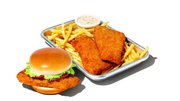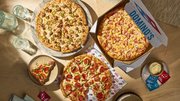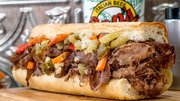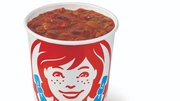Article
How to sustain sustainability, despite obstacles: experts weigh in
Three brands take on the challenges and rewards of one very hot restaurant topic: sustainable operations.

November 5, 2018 by S.A. Whitehead — Food Editor, Net World Media Group
 |
Shown from left to right: Essity's Tracey Fullington, CoreLife’s Scott Davis, Asian Box's Mike Speck and Flatbread’s Gonca Esendemir. Photo by Matthew Tilbury |
Among the many foodservice industry buzzwords today, sustainability has to rank right up there with spicy international cuisines and organically grown ingredients. After all, knowing that your business operates in ways that are better for the environment has been shown to make customers feel better about splurging on dining out, and anything that makes customers feel better about themselves and their brands works wonders for businesses.
But during a recent hour-long panel discussion at last month's Fast Casual Executive Summit in Seattle, three brands were quick to share that operating sustainably is rife with impediments along the way to "doing right" by "Ma Earth." In the session, moderated by Essity North America National Account Manager Tracey Fullington, the panelists found that they were facing many of the same challenges on their sustainability journeys. They included:
- Asian Box CEO Mike Speck.
- CoreLife Eatery President and CCO Scott Davis, who had previously spent several years as chief concept officer for Panera Bread.
- Flatbread Grill co-founder and CMO Gonca Esendemir.
The questions kicked off with one that surveyed the brands about their sustainability practices. In the answers below, it's clear most have been using either furnishings, foods or other sustainable practices since Day One. In fact, the subject was actually incorporated into the mission of the brands, as we heard first from CoreLife CEO Scott Davis.
CoreLife: Yeah, for us it's been part of our mission since the beginning in that one of the pillars of where we come from is really good, clean sourcing and food you want to eat. ... So we're doing things a lot more locally and with a footprint that is a lot closer to the store.
Flatbread: We started using sustainable furniture at our second store.
Asian Box: Our employees ... and customers ... (they ask) how do you make them proud? That's one of the key questions we ask. So we are made-to-order street food ... and we've got to create the aura about also the practicality of it and that really comes at a cost.
- Question: On that subject, how does your brand use green practices without added costs?
Flatbread: When we first started, sustainability really wasn't a buzzword, so we had to learn how to be sustainable and ... it cost a lot more back then to be sustainable than it does now, you know. ... We had to decide whether to go full on organic where everything is sustainable or whether we wanted to be where we are now where we're sustainable, but not on all touchpoints. You have to decide that for your brand. So it's things like we use a smaller footprint and we switched with our second store from silverware to melamine (utensils).
Asian Box: All good things come at a cost. So as far as sustainable development, we have a project right now to redefine our (store) prototype. The purpose of this is to make the cost the cost, and not have overruns like what usually happens. So, in this case, we're spending more money upfront to get a really good prototype made.
- Q: What about allotting money for sustainability initiatives at your brands?
CoreLife: I've found that when you look (at sustainability for the brand) piece by piece, you really end up not taking any action because you're just stifled by it. So part of it is, 'How do you look at the whole of what ...what you're trying to do and ... then somewhere between sustainable and really workable you strike a balance where your brand meets it. ... So we have a range we want to be in for a series of things related to sustainability, for instance.
Flatbread: It goes back to who you are as a brand (in how you allot sustainable initiative cash). Like, we're looking at ways to keep our footprint low. If we do smaller stores, then it really becomes more like a take-out and delivery situation for us.
And we're doing self-ordering kiosks now and I think the next thing will be focused on the little things, like the straws. ... But, also for the future, we're trying to look ahead and see what the next big sustainability issue is going to be. If you can predict that, then you can preplan.
- Q: How do you get your franchisees to invest in sustainability practices and products?
Asian Box: It's not always obvious. ... Like, with compostable boxes, when they were stacked, we found they don't come apart again, so you have to come up with creative ways to pre-stack boxes to get around that, and that's a cost, too.
But then the same customers who complain about us not using compostable (packaging) also complain about their (compostable) packaging falling apart before they get home. So we're thinking about all these pieces. Like we had a disposable bag (being used), but we figured out how to use a smaller bag to offset the food packaging (impact). But that is not always obvious to franchisees.
CoreLife: We're very upfront about that from the moment we start talking to them about franchising. You can't take it apart — you've really got to hold that together in that this all fits with what you're trying to do.
Flatbread: You don't want people to reinvent your brand. Like, I've been doing this 12 years and I am on the frontline and dealt with customers and I've made the food. I was there; I was "in" the brand.
So yes, if (franchisees) come up with something you never thought of, then, yes, I'm open to it. But you really don't want (franchisees) to reinvent your brand — they have to be able to accept all parts of it. Franchisees have to understand who you are and what your values are.
- Q: On social media and elsewhere also there has been a lot of buzz about customers who want compostable packaging but are not willing to deal with the trade-offs present in some compostable products. How do you deal with that?
Asian Box: For me, one thing that I've found so important for us is to educate our hourly workers (around sustainability practices). It's really ironic how (some customers) with a cause can take things out on an 18-year-old cashier ... and that has been an obstacle for us.
CoreLife: A lot of (the response to social media negativity about packaging) is not even us responding, but it's really our customers who really self moderate (the social media conversation). But still, for us it always comes down to, "Is it workable?" It (the sustainable practice) has to work.
Also, when I was at Panera, one thing we found helpful was staffing your locations and surveying customers to find out what people thought about us. We would have one person at every location to act as a conduit ... who channeled information in and fed it back to us.
- Q: How do you sustain your brand through this issue?
CoreLife: For us, it's about the people who want to eat healthily and giving them a choice.
Asian Box: Ours is gluten-free, fresh, made-to-order Vietnamese street food. You have to make it simple ... because for me it's something like "connecting" and we've got to take it to that simple of a level to make it flow through to the customer.
Flatbread: For us, we started as a family ... and my parents were in poverty in Turkey ... and we grew up very poor. So these are our values to grow this brand to sustain that we didn't follow trends, we have stayed true to our core: the food we love, the food we grew up on.
The people who work for us, they're working for a family. Some people come in and think we're a big corporation, but then they meet my sisters and I and see you're not dealing with corporate values, we're dealing with family values. That's how we run the business and I think that is what's going to sustain us.
Photo: Matthew Tilbury
About S.A. Whitehead
Pizza Marketplace and QSRweb editor Shelly Whitehead is a former newspaper and TV reporter with an affinity for telling stories about the people and innovative thinking behind great brands.
 ChatGPT
ChatGPT Grok
Grok Perplexity
Perplexity Claude
Claude









